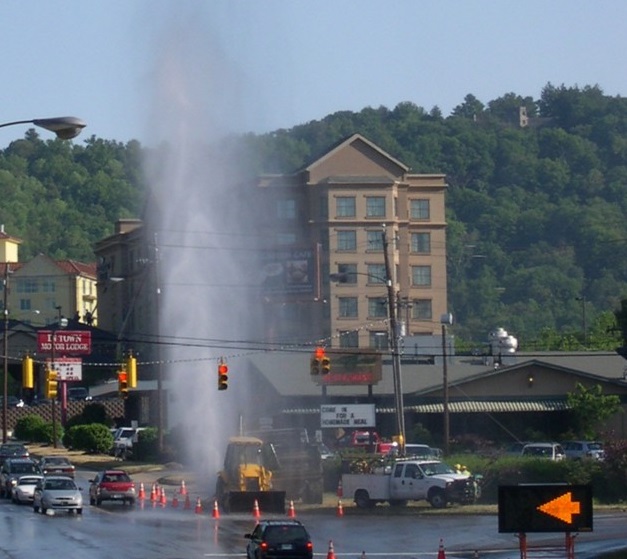The City of Asheville’s Non-Revenue Water Program has helped reduce water loss due to line breaks by 2.5 million gallons per day.
Asheville program becomes a model
for other communities
For Asheville Water Resources, the challenges that come with an aging infrastructure, nearly 1,700 miles of transmission lines spread over mountainous terrain, and the extremely high water pressure is not just a constant challenge for department management and staff — it is a way of life.
A few interesting facts about the City of Asheville water system and the circumstances department personnel must be prepared to face:
- 1,500 feet in elevation changes;
- More than 50 different pressure zones throughout the infrastructure;
- Water pressures in excess of 400 psi in some locations.
Over the years, this pressure on the Asheville water system’s older pipes led to breaks that added up to substantial amounts of water loss. An audit in the early 2000s conducted by an outside consultant found that the City produced 21.5 million gallons of treated water per day. Out of the 21.5 million gallons produced, the department was losing nearly 7 million gallons of the water through various breaks and leaks, or nearly 33 percent. Although the City has great water-producing capacity, management realized the department needed to become more pre-emptive in finding a way to reduce that unaccounted for loss.
Thus the Non-Revenue Water Program was born, and the department has realized significant savings, both financially and structurally, to the system since the program was formed.
Special opps
When the NRW program was launched in 2012, a special team devoted to managing non-revenue water focused their efforts on making significant reductions in lost water — literally unaccounted for water down the drain. Among measures the Non-Revenue Water Team took:
- Launch of a Valve and Leak Crew, focused on proactive leak detection and repair and control valve maintenance;
- Pressure Team that maintains a pressure database and provides input for pressure optimization in areas with high pressure throughout the system;
- Metering Team that executes large and small meter testing programs for accuracy and revenue.
- A project that consisted of the installation of 23 master meters to better regulate and control existing pressure zones.
All water systems have water losses — though the extent varies from one identity to the next. To complicate matters with further challenges, tracking loss is not a cut-and-dried science. Asheville Water Resources staff not only had to access high-risk areas for breaks and leaks, but also work with other departments, such as the Asheville Fire Department, for data integrity.
Asheville’s Water System is home to 20 fire substations throughout Asheville and Buncombe County. The Water Resources Audit Team set out to meet with each of these stations to develop a greater understanding of their water use and needs. When dedicated fire personnel are fighting a fire where it is a life or property saving situation, water literally goes down the drain. All of these dynamics, plus more, had to be factored into the Non-Revenue Water Program when working in collaboration with the various fire departments and divisions.
Over time, these targeted efforts has addressed issues with consistency. Asheville’s Non-Revenue Water Program has seen steady reductions in water losses — nearly 2.5 million gallons per day of reduction since the program began! It should also be noted this has been achieved during a time of economic growth for the City and community, also.
A model for other communities
As awareness of the need for healthy, clean drinking water becomes more transparent, so does the reality of what role communities can play with such a vital resource. Asheville has become a model for other organizations to follow through sustainability, accountability and financial growth.
Asheville’s Non-Revenue Water program has been featured in magazines, conferences and webinars throughout the country, and, thanks to the dedication to the NRW program, Asheville’s water system continues to find ways to consistently improve, as well.
